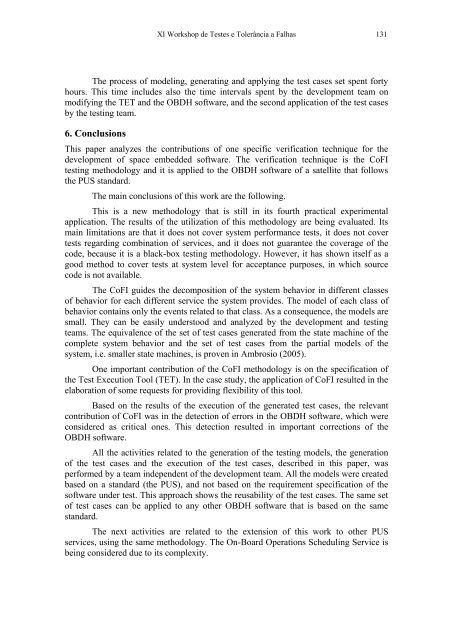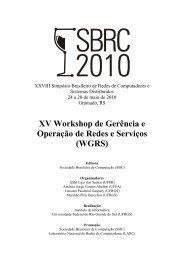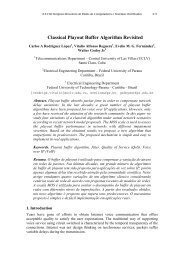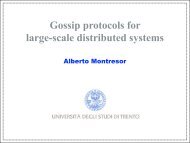XI Workshop de Testes e Tolerância a Falhas (WTF) - SBRC 2010
XI Workshop de Testes e Tolerância a Falhas (WTF) - SBRC 2010
XI Workshop de Testes e Tolerância a Falhas (WTF) - SBRC 2010
Create successful ePaper yourself
Turn your PDF publications into a flip-book with our unique Google optimized e-Paper software.
<strong>XI</strong> <strong>Workshop</strong> <strong>de</strong> <strong>Testes</strong> e Tolerância a <strong>Falhas</strong> 131<br />
The process of mo<strong>de</strong>ling, generating and applying the test cases set spent forty<br />
hours. This time inclu<strong>de</strong>s also the time intervals spent by the <strong>de</strong>velopment team on<br />
modifying the TET and the OBDH software, and the second application of the test cases<br />
by the testing team.<br />
6. Conclusions<br />
This paper analyzes the contributions of one specific verification technique for the<br />
<strong>de</strong>velopment of space embed<strong>de</strong>d software. The verification technique is the CoFI<br />
testing methodology and it is applied to the OBDH software of a satellite that follows<br />
the PUS standard.<br />
The main conclusions of this work are the following.<br />
This is a new methodology that is still in its fourth practical experimental<br />
application. The results of the utilization of this methodology are being evaluated. Its<br />
main limitations are that it does not cover system performance tests, it does not cover<br />
tests regarding combination of services, and it does not guarantee the coverage of the<br />
co<strong>de</strong>, because it is a black-box testing methodology. However, it has shown itself as a<br />
good method to cover tests at system level for acceptance purposes, in which source<br />
co<strong>de</strong> is not available.<br />
The CoFI gui<strong>de</strong>s the <strong>de</strong>composition of the system behavior in different classes<br />
of behavior for each different service the system provi<strong>de</strong>s. The mo<strong>de</strong>l of each class of<br />
behavior contains only the events related to that class. As a consequence, the mo<strong>de</strong>ls are<br />
small. They can be easily un<strong>de</strong>rstood and analyzed by the <strong>de</strong>velopment and testing<br />
teams. The equivalence of the set of test cases generated from the state machine of the<br />
complete system behavior and the set of test cases from the partial mo<strong>de</strong>ls of the<br />
system, i.e. smaller state machines, is proven in Ambrosio (2005).<br />
One important contribution of the CoFI methodology is on the specification of<br />
the Test Execution Tool (TET). In the case study, the application of CoFI resulted in the<br />
elaboration of some requests for providing flexibility of this tool.<br />
Based on the results of the execution of the generated test cases, the relevant<br />
contribution of CoFI was in the <strong>de</strong>tection of errors in the OBDH software, which were<br />
consi<strong>de</strong>red as critical ones. This <strong>de</strong>tection resulted in important corrections of the<br />
OBDH software.<br />
All the activities related to the generation of the testing mo<strong>de</strong>ls, the generation<br />
of the test cases and the execution of the test cases, <strong>de</strong>scribed in this paper, was<br />
performed by a team in<strong>de</strong>pen<strong>de</strong>nt of the <strong>de</strong>velopment team. All the mo<strong>de</strong>ls were created<br />
based on a standard (the PUS), and not based on the requirement specification of the<br />
software un<strong>de</strong>r test. This approach shows the reusability of the test cases. The same set<br />
of test cases can be applied to any other OBDH software that is based on the same<br />
standard.<br />
The next activities are related to the extension of this work to other PUS<br />
services, using the same methodology. The On-Board Operations Scheduling Service is<br />
being consi<strong>de</strong>red due to its complexity.







